COMMENT Book of Heaven:
Text, quotation from Luisa Piccarreta from Vol. 21 before.
Frank M. Regan OFS has 3 books of abridgment from Luisa, and in ways beautifully clear in sense. http://www.frankrega.com/luisaimportant.htm
Example parallel below.
Life of the Mystic Luisa Piccarreta: Journeys in the Divine Will - The Middle Years - Part-B
by Frank Rega
Divine Will Volume
Twenty-one
VOLUME 21
J.M.J.
Fiat!
March 5, 1927
How firmness in good is
only of God, for once He has done an act, it never ceases. Effects of firmness.
How the Humanity of Our Lord was the bond of times, the remedy and the model.
How God wants the rights of the Divine Will to be secured.
I felt myself in a slumber
of affliction because of the privation of my sweet Jesus, and in my interior I
said to Him: ‘My Love and my life, how is it? You have departed from me without
saying good-bye, without teaching me where to direct my steps, or the way I
must follow in order to find You. Even more, it seems to me that You Yourself
have burned away the paths through which You may be found. And as much as I
wander around and call You, You do not listen to me – the paths are closed; and
exhausted with tiredness, I am forced to stop, longing for the One whom I wish
to find at any cost, but I don’t. Ah! Jesus! Jesus! Come back - come to the one
who cannot live without You.’
But while I was pouring
out my pain, He just barely moved in my interior; and as I felt Him move, I
said to Him: ‘My Jesus, my life, how is it? You make me wait for so long, to
the point that I cannot take anymore; and if You make Yourself seen, You just
flash by, and You don’t say anything to me. So it becomes darker than before,
and I remain fidgety and delirious with pain; I search for You; I call You –
but I wait for You in vain.’
The Divine Firmness
And Jesus, compassionating
me, told me: “My daughter, do not fear, I am here with you. What I want is that
you never go out of my Will, and that you continue your acts - always, without
ever moving from the boundaries of the Kingdom of the Supreme Fiat. This will
give you the firmness which will make you be like your Creator – once He has
done an act, that act has the virtue of continuing, without ever ceasing. An
act which is always continuous, is only of God, who suffers no interruption in
His acts. This is why Our firmness is
unshakable, and extending everywhere with Our immensity, it renders Our acts
uninterrupted. Wherever We lean, We find Our firmness,
which gives Us the greatest honor – it makes Us known as the Supreme Being,
Creator of all, and renders Our Being and Our acts inexorable. In fact,
whatever place We want to lean on, We find Our firmness,
which sustains everything.
My daughter, firmness is of divine nature, and a divine endowment; and so
it is right that We give this participation and endowment of divine nature to
one who must be daughter of Our Divine Fiat, and who must live in Our Kingdom.
So, the fact that you continue your acts in It, without ever interrupting them,
reveals that you already are in possession of the endowment of Our firmness. How many things firmness
says. It says that the souls moves only for God; it says that she moves with
reason and out of pure love – not with passion and out of self-interest. It says
that she knows the good she does, and therefore she is firm in
it, without ever interrupting it. Firmness
says, with indelible characters: “Here, there is the finger of God”. Therefore,
be firm in your acts, and you will have Our
divine firmness within your works.”
Afterwards, I was
continuing my acts in the Supreme Volition, and as I arrived at the point of
following the acts of Jesus, from the moment of His conception in the womb of
the Immaculate Queen, up to His death on the Cross, my adorable Jesus, making
Himself felt again in my interior, told me: “My daughter, my Humanity came upon
earth as though in the midst of times, in order to reunite the past, when, in
creation, the fullness of my Will reigned in man. Everything belonged to It;
everywhere It had Its kingdom – Its operative and divine life. And I enclosed
this fullness of my Divine Will in Me, and binding those in the present, first
I became the model to form the remedies which were needed, the helps and the
teachings which were necessary to heal them; and then I bound the posterity to
the fullness of that Divine Will which reigned in the first times of creation.
Therefore, my coming upon earth was a bond of reunion of times;
it was the remedy in order to form this bond, so that the Kingdom of the Divine
Fiat might return into the midst of creatures; it was the model for all, so
that, being molded, they would be tied to the bonds formed by Me. This is why,
before speaking to you about my Will, I spoke to you about my coming upon
earth, of what I did and suffered, in order to give you the remedies and the
model of my own life; and then, I spoke to you about my Will: it was bonds that
I formed in you, and in these bonds I formed the Kingdom of my Will. A sign of
this is the many knowledges I manifested to you about It; Its sorrow for not
reigning with all Its fullness in the midst of creatures, and the goods It
promises to the children of Its Kingdom.”
Then I continued to pray, and I was almost asleep, when, all of
a sudden, I heard someone speak in a loud voice within me. I paid closer
attention, and I saw my beloved Jesus with His arms raised, in the act of
embracing me, saying to me with powerful voice: “My daughter, I ask nothing
else from you but this: that you be the daughter, the mother, the sister of my
Will, and that you place in safety within you, Its rights, Its honour, Its
glory.” He said this with a loud and powerful voice. Then, lowering His voice
and hugging me, He added: “My daughter, the reason for which I want the rights
of my Eternal Fiat to be secured, is that I want to enclose the Most Holy
Trinity in the soul. My Divine Will alone can give Us the place and the glory
worthy of Us. Through It, We can operate freely and place in you all the good
of creation, forming even more beautiful things, because with Our Will in the
soul, We can do everything, while, without It, We would lack the place in which
to put Ourselves, and in which to lay Our works; so not being free, We remain
in Our celestial residences.
It happens as to a king, who, loving one of his subjects with
excessive love, wants to lower himself to live in his little hovel. But he
wants to be free; he wants to put royal things in the little hovel; he wants to
command; he wants that subject to eat of his good and delicate foods together
with him. In sum, he wants to live his life of king. But the subject does not
want him to put his royal things, or to command; nor does he want to adapt
himself to the food of the king. The king does not feel free; so, for love of
freedom, he goes back to his royal palace.
Wherever my Will does not reign, I am not free; the human will
causes a continuous contrast with Mine; therefore, not having Our rights
secured, We cannot reign, so We remain in Our royal palace.”
March 10, 1927
How, in Creation, God gave the rights to possess the Kingdom of the Divine
Will.
.........
Life of the Mystic Luisa Piccarreta
The Middle Years - Part B
Luisa Piccarreta
Précis (abridged) by
Frank M. Rega OFS 2014
www.lifeofluisa.com
The Divine Firmness
Luisa was restless and sorrowful because of the absence of the
One with Whom she could not live without. But the Lord, compassionating her, said
that she should not fear, because He is with her. He told her that He never
wants her to go out of His Will. She must continue her acts, without ever
moving from the boundaries of the Kingdom of the Supreme Fiat. This gives her a firmness [fermezza], similar to that of her
Creator. Once He has done an act, it has continuous life, and never ceases. This
firmness is unshakable, and it extends everywhere in the divine immensity. It
gives the Divinity great honour, making God known as the Supreme Being and
Creator of everything.
His firmness sustains everything. It is of a divine nature and
quality, and it is right that the daughter of the Fiat who lives
in the Divine Kingdom should participate in this quality. When
Luisa continues her acts in His Will, without
ever interrupting them, it reveals that she is in possession of the quality
of the divine firmness. Such solidity indicates that the soul moves only for
God, that she acts with reason and out of pure love, not
from passion or self-interest. She knows the good that she does and remains firm in it, without
stopping. Firmness signifies the presence of the
finger of God.
After this, while Luisa was continuing to pray, she
suddenly heard Jesus speaking within her in a loud and powerful voice. He told
her that He wants her to be the daughter, mother, and
sister of His Will, and asked that she place its rights, honor
and glory in safety within herself. Then, softening
His voice and embracing her, He said that the reason He
wants the rights of the Eternal Fiat placed in safety is
because He wants to enclose the Most Holy Trinity in the soul. Only
the Divine Will can give the Divinity the place
and glory worthy of It. By means of the Fiat, the
Most High can operate freely and lay within her all
the good of Creation, forming yet more beautiful things.
With the Fiat reigning in the soul, the
Trinity can do everything, but without it, the place in which the
Divinity can enclose Itself and operate freely
is lacking. Wherever the Divine Will
does not reign, God does not feel free, since the human will causes continuous
contrast with the Divine Volition. Not being free and without His rights in safety,
God remains in the celestial dwellings (03/05/1927).
www.frankrega.com/luisaimportant.htm
12 Feb 2014 - ... that introduces her writings,. Life of the Mystic Luisa Piccarreta Journeys in the Divine Will - the Early Years. please visit www.lifeofluisa.com ...
 Saint Dominic.
Saint Dominic.

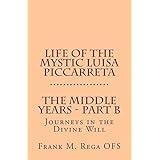

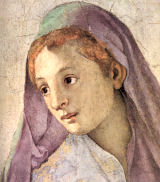
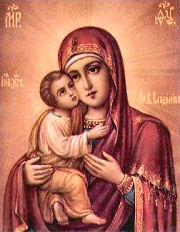 August is often considered the transitional month in our seasonal calendar. It is the time of the year we begin to wind-down from our summer travels and vacations and prepare for Autumn — back to school, fall festivals, harvest time, etc. The Church in her holy wisdom has provided a cycle of events in its liturgical year which allow the faithful to celebrate the major feasts in the life of Christ and Mary. Most notably, during August, we celebrate the feast of the Transfiguration (August 6) and the feast of the Assumption (August 15).
August is often considered the transitional month in our seasonal calendar. It is the time of the year we begin to wind-down from our summer travels and vacations and prepare for Autumn — back to school, fall festivals, harvest time, etc. The Church in her holy wisdom has provided a cycle of events in its liturgical year which allow the faithful to celebrate the major feasts in the life of Christ and Mary. Most notably, during August, we celebrate the feast of the Transfiguration (August 6) and the feast of the Assumption (August 15).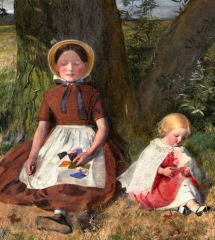 The days of summer have provided a welcome change of pace. However, while vacations afford us the time to relax and refresh, the change of habits and routines can also have a negative impact on our spiritual lives. As if to re-ignite us, the Church offers us in the plethora of August feasts vivid examples of the virtue of perseverance: six martyrs — two who are named in Canon I of the Mass and two who were martyred during World War II; seven founders of religious congregations, as well as three popes and two kings; the apostle, St. Bartholomew; the great Doctor of the Church, St. Augustine and St. Monica, his mother; the humble patron saint of parish priests, St. John Vianney, and the patron of deacons, St. Lawrence, who joked with his executioners while being roasted alive.
The days of summer have provided a welcome change of pace. However, while vacations afford us the time to relax and refresh, the change of habits and routines can also have a negative impact on our spiritual lives. As if to re-ignite us, the Church offers us in the plethora of August feasts vivid examples of the virtue of perseverance: six martyrs — two who are named in Canon I of the Mass and two who were martyred during World War II; seven founders of religious congregations, as well as three popes and two kings; the apostle, St. Bartholomew; the great Doctor of the Church, St. Augustine and St. Monica, his mother; the humble patron saint of parish priests, St. John Vianney, and the patron of deacons, St. Lawrence, who joked with his executioners while being roasted alive.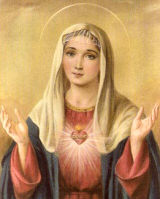
 On November 1, 1950, Pope Pius XII defined the dogma of the Assumption. He solemnly proclaimed that the belief whereby the Blessed Virgin Mary, at the end of her life on earth, was taken up body and soul, into the glory of heaven, definitively forms part of the deposit of faith, received from the apostles.
On November 1, 1950, Pope Pius XII defined the dogma of the Assumption. He solemnly proclaimed that the belief whereby the Blessed Virgin Mary, at the end of her life on earth, was taken up body and soul, into the glory of heaven, definitively forms part of the deposit of faith, received from the apostles.




